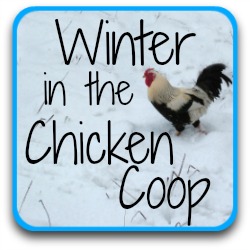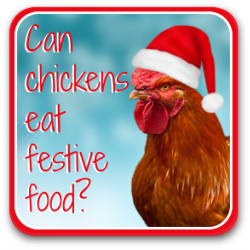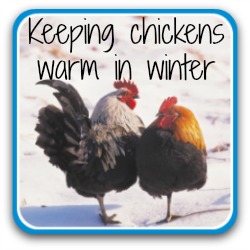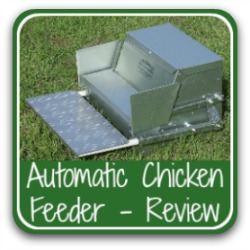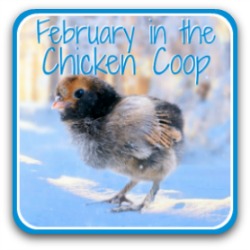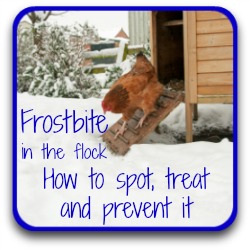- Home
- Winter care
- 7 tips
7 tips for caring for chickens in the winter.
Can chickens survive winter outside?
Yes, and much better than many people expect.
But winter still brings real challenges: fewer natural food sources, frozen waterers, long stretches of cold, damp weather, and more time spent indoors.
As ever, a little preparation goes a long way toward keeping your flock healthy, warm and content until spring returns.
I live in Italy, where winter often arrives suddenly and stays longer than anyone would like. This article covers the seven simple, reliable steps that have helped my own flock stay comfortable through snow, ice, sleet and endless muddy days.
Each tip gives you one quick action you can take right now, plus a link to longer guides for more detail.
Let's begin with the most important winter question of all: how to feed your chickens well when the weather turns cold.
🪶 Featherlight Takeaways.
Quick insights from this article: especially helpful if winter has arrived suddenly and you need fast, reliable steps.
- Ferment your chickens' regular feed.
- Add extra protein.
- Lentils: sprout for an inexpensive winter treat.
- Keep water unfrozen and support immune health by adding apple cider vinegar.
- Make winter-ready roosts to protect feet.
- Ensure good ventilation.
- Create a simple "chicken gym" to counteract boredom.
1. The best way of feeding chickens in the winter.
Chickens burn more calories in winter to maintain their body temperature, so keeping their diet balanced, not just bigger, is key.
The simplest, most effective way to boost nutrition without upsetting that balance is to enhance the feed they already know.
Tip 1: ferment your flock's feed.
Fermented feed has been used for centuries, and modern research backs up its benefits for chickens(e.g.1). Fermenting their regular pellets or mash:
- increases beneficial gut bacteria
- makes nutrients easier to absorb
- improves eggshell strength
- supports immunity
- has even been linked with longer life expectancy in chickens(2).
And the best part?
Chickens adore it. If I put down fermented feed, I have to step back quickly. My girls come running like it's warm crumble cake.
🐥 A note from my flock: here's the evidence. I make fermented feed, put it on a large platter so everyone can reach it, and move away from the rush to get to it first!
 Three of my hens dominating the fermented feed tray!
Three of my hens dominating the fermented feed tray!How to make fermented feed.
- Want more detail? Read about the benefits of fermented feed.
2. Best protein to sustain chickens in the winter cold.
Winter brings extra demands on a chicken’s body: cold temperatures, fewer insects and greens, moulting, and increased predator stress to name but a few.
A modest protein boost can help, but beware: too much can strain the liver and kidneys.
Tip 2: make my ultra-easy Poultry Protein Platter.
This simple recipe uses everyday ingredients to give your flock a safe, nutritious protein lift when they need it most.
It has been shared more than 75,000 times on Pinterest, and my hens still sprint when they see me carry the bowl out.
It’s not an everyday feed, just an occasional winter support food. But it’s inexpensive, quick to make, and much loved by chickens.
 Six of my hens rushing to get to the protein platter before anyone else!
Six of my hens rushing to get to the protein platter before anyone else!My Protein Platter recipe (full ingredients, instructions, and when to use it).
3. Best treat for chickens in winter.
Winter is the leanest season for natural foraging. Grass turns to mud, insects vanish, and even hardy weeds retreat until spring.
So finding treats that are nutritious, affordable and available year-round becomes much more difficult.
Time to think outside the run...
Tip 3: lentils help chickens beat the winter cold!
They may not sound glamorous, but lentils are a winter gem. They’re:
- inexpensive and available all year
- low in fat
- high in antioxidants and minerals
- easy to use cooked or sprouted
- a brilliant boredom-buster when sprouted.
My girls adore lentil sprouts, and they’re so quick to grow that I often start a fresh jar while the kettle boils.
🐥 A note from my flock: whenever I bring out a bowl of sprouted lentils, my Red Stars charge over as if I've produced a gourmet feast. They peck so enthusiastically that the bowl sometimes travels across the run!
It's one of the few winter treats that disappears in minutes.
 My Red Stars chomping down on their lentil sprout treats.
My Red Stars chomping down on their lentil sprout treats.Follow my 4-step seed-sprouting guide.
Or try my simple Italian-style lentils recipe.
4. Best way to provide winter water.
Keeping chickens hydrated in winter can be tricky. Waterers freeze, metal drinkers ice over quickly, and hens won't drink chilled water if they can avoid it.
If you have power in your coop, a heated waterer (#affiliate ad) is ideal, not to warm the water, but just to stop it freezing.
Here's how to add nutritional value to water to help support chickens' winter health.
Tip 4: add apple cider vinegar (ACV) to your chickens' water.
A lot of claims are made for apple cider vinegar, many unproven. Among the known, proven benefits(4) are...
- a gentle increase in body temperature
- potential help in controlling coccidiosis
- supports the immune system
- reduced harmful bacteria in the gut.
A small amount goes a long way, and only use it in plastic waterers (the acidity can damage metal).
And importantly, only use ACV in winter, never in summer. The warming effect is the exact opposite of what chickens need during hot weather.
 Bonus tip: make your own ACV – apple trees provide shade in summer!
Bonus tip: make your own ACV – apple trees provide shade in summer!For the correct dilution, timing and scientific references, here's my full...
Guide to using apple cider vinegar safely.
5. Best way of keeping chickens warm through the winter cold.
Chickens deal much better with cold than with heat. As long as they have food, shelter, ventilation and space to roost comfortably, they're generally well equipped to stay warm without heaters or sweaters.
Tip 5: make sure your roosts are winter-ready.
On bitter winter nights, chickens keep themselves warm by fluffing their feathers and settling down over their feet. A well-designed roost lets them do exactly that.
All they really need from a winter roost is:
- a flat, comfortable surface where they can cover their toes (which are especially prone to frostbite).
- a stable perch that allows them to huddle naturally
- dry, draft-free air around them, with ventilation above head height
This quick winter rule works well: if their toes can tuck under their feathers and stay dry, you've got a good winter roost.
 My chickens roosting on a flat surface to cover their feet.
My chickens roosting on a flat surface to cover their feet.For full guidance on:
- ideal dimensions
- materials
- placement
- how wide the perch should be for different breeds
-
and how to get roosting right in any coop
- Read my detailed guide to the ideal winter roost set-up.
Should you heat the coop in winter?
This is a very regular question, to which the general answer is "no", unless you’re caring for featherless rescues or live somewhere with really extreme winter temperatures.
The safest choice is no extra heat.
If you're still unsure, I've written a full guide to keeping chickens warm in the winter.
6. Best way to protect chickens from frostbite.
Frostbite is one of winter's nastier surprises. It happens when cold, damp air settles on combs, wattles or toes and then freezes, often overnight.
Even cold-hardy breeds can be affected, and while it doesn't always kill, it is painful and can lead to infection.
The good news? The best prevention is simple.
Tip 6: ventilate your coop properly to prevent frostbite.
It's easy to assume that a tightly sealed coop is warmer and therefore safer. In reality, the biggest enemy in winter isn't cold, but damp, humid air.
Focus on this checklist:
- Look for moisture: if you see condensation on windows or walls, there's too much humidity.
- Check ventilation height: vents should be above head height when chickens are roosting, so fresh air flows through without creating a draft on the birds.
- Don't block vents: it's tempting to tape everything up in cold weather, but that traps moist air and increases frostbite risk.
- Check chickens regularly: blackened comb tips, pale or swollen wattles and painful toes can all be signs frostbite has already started.
 Blackened tips to the comb are a sure sign of frostbite.
Blackened tips to the comb are a sure sign of frostbite.Want photos, step-by-step treatment and a full prevention checklist? Find it all in my...
7. Best way to prevent bad behaviour in winter.
Shorter days, wet weather and snow all mean the same thing: chickens spend more time indoors, and that can quickly lead to boredom, frustration and squabbles.
Feather pecking, egg eating, low-level bullying and even a form of depression often rise in winter simply because the flock has less to do.
Tip 7: build a simple chicken gym to prevent boredom.
Chickens are woodland birds by nature. Hopping, perching (even in trees), exploring and scratching are their natural stress-relievers.
So try to recreate that, either indoors or in a sheltered run with:
- logs or stumps
- old ladders
- sturdy branches
- leftover Christmas trees
- a tarpaulin over one corner for a dry "play zone".
This simple "jungle gym" gives height, interest, and somewhere to escape if flock dynamics get tense.
As a bonus, old logs often hide bugs, which is a thrilling discovery for your flock in winter.

Want more simple, inexpensive winter ideas?
See my full guide to beat winter boredom in the coop.
How cold is too cold for chickens?
How cold is too cold for chickens?
Surprisingly low temperatures are fine for healthy adult birds, as long as they're dry and out of the wind.
The real danger is moisture plus freezing air, which increases frostbite risk.
(A full extreme-cold article is coming soon.)
Should I insulate my chicken coop?
Should I insulate my chicken coop?
Insulation helps only if ventilation remains excellent. Never block vents: a sealed coop traps moisture, and that dramatically increases frostbite risk.
Modern coops like the Eglu Cube have calculated the right balance between insulation and ventilation so you don't need to worry.
How do I stop chicken water freezing in winter?
How do I stop chicken water freezing in winter?
Use a heated waterer if you have electricity, or refresh water several times a day. Black rubber bowls are useful because they're easy to flex and release ice.
Why do chickens stop laying in winter?
Why do chickens stop laying in winter?
Shorter daylight hours reduce the hormones that drive egg production. It's normal, temporary, and not a sign of illness unless other symptoms appear.
Here's my guide to why chickens stop laying if you'd like more information.
More winter-themed articles.
Sources.
A lot of "facts" you'll find on the internet are often people's individual views, based on inaccurate information repeated from poor quality sources.
The information I provide in this article and others is based not just on my own experience, but on evidenced facts from scientific, peer-reviewed research and books from highly respected and experienced poultry keepers such as Gail Damerow.
Some of the trusted sources I have used in this article are these.
1. Engberg et al: Fermented feed for laying hens: effects on egg production, egg quality, plumage condition and composition and activity of the intestinal microflora. Pub U.S. National Library of Medicine, March 2009.
2. Steenfeldt, S, et al: Effect of feeding silages or carrots as supplements to laying hens on production performance, nutrient digestibility, gut structure, gut microflora and feather pecking behaviour. Pub. Journal of British Poultry Sciences, 2007.
3. Firas, F.M.F. Hayajneh et al: Anitcoccidial Effect of Apple Cider Vinegar on Broiler Chickens: an Organic Treatment. Pub. Polish Journal of Veterinary Sciences, 2018.
5. Struelens, Dr E et al: Perch width preferences of laying hens. Pub. British Journal of Poultry Science, 2009.
7. RSPCA: Welfare standards for chickens. Pub. Royal Society for the Protection of Cruelty to Animals, 2002.
- Home
- Winter care
- 7 tips

